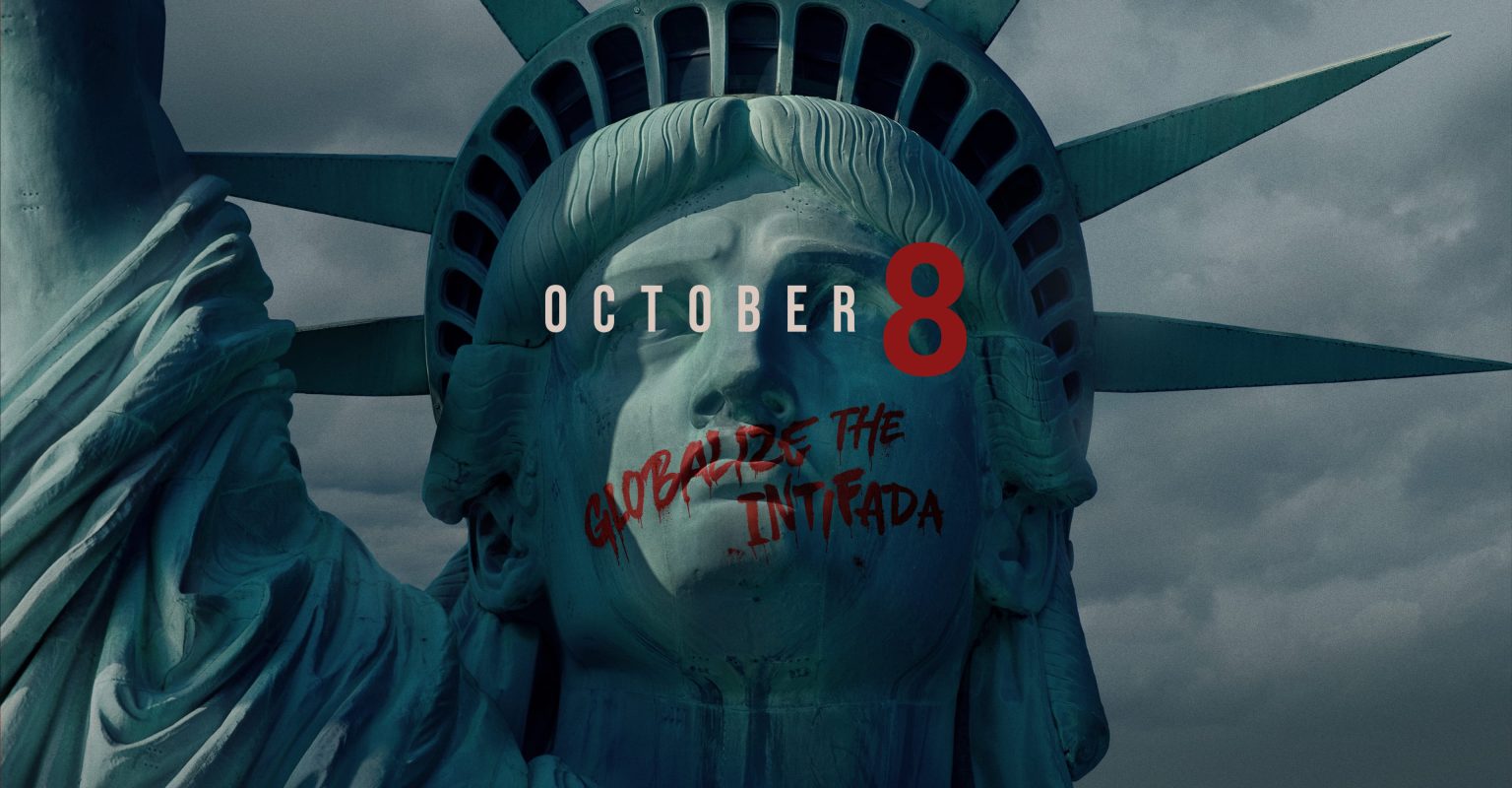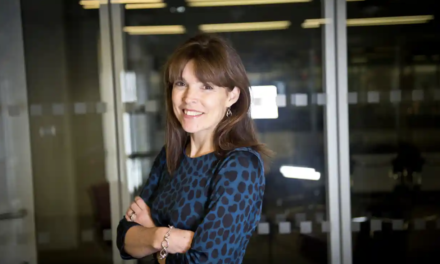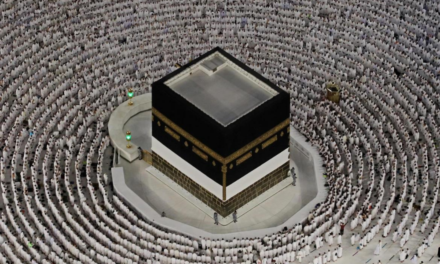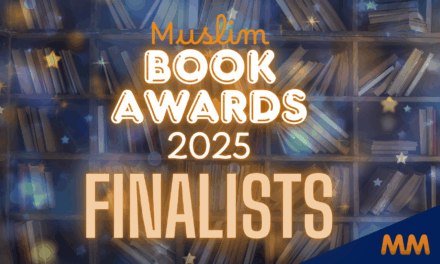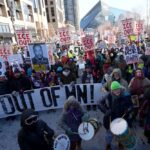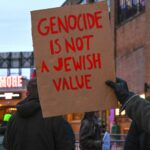The official movie poster for October 8 (Via social media)
OCTOBER 8
Directed by Wendy Sachs
100 min. Briarcliff Entertainment 2025
Since Trump took office, at least 300 student visas have been revoked and students, including permanent residents, have been detained by ICE. This unfolds while universities are commanded to cave to extreme anti-educational, anti-democratic, and pro-Israel initiatives to receive federal funding. Columbia, for example, has not only agreed to “advance Columbia’s Tel Aviv Center” but also to appoint a Senior Vice Provost who will review curriculum and programs in Middle Eastern, South Asian, and African Studies departments, in exchange for the $400 million dollars in federal funding that it previously expected. And yet, amid these authoritarian crackdowns on university campuses and student activist lives, the new film “October 8,” directed by Wendy Sachs, depicts college campuses as spaces that have devolved into anarchy, where lawlessness translates to hatred and racism, and the only victims are Zionist Jewish students.
The film’s argument is illogical and sloppy. Often scary-sounding claims are made by interviewees and the footage that follows disproves the claim. But that does not matter, for the objective of a propaganda film like “October 8” is not to impart information but to cause widespread panic— panic that viewers must hold onto well past the film’s end, panic that will lead them to support the violent crackdowns and bulldozing of student rights that we are seeing play out right now.
Conflating antisemitism and anti-Zionism
The film opens with raw footage from the October 7 attacks. It’s followed immediately with a first-person account of the attacks by Irit Lahav, a resident of the Kibbutz Nir Oz. She shows the room she hid in with her daughter, and how she braced the door and turned off the lights for hours. All the while, in the darkness, she read the WhatsApp messages from the kibbutz’ community chat: “They shot my husband,” “They’re in my house,” “My husband was shot. He is bleeding.” The film then cuts to Shai Davidai’s apartment in New York City, Noa Tishby in Los Angeles, and Tessa Veksler, a student at UC Santa Barbara. Each recounts their experience of October 7. Immediately, less than 10 minutes into the film, Israel, New York City, Los Angeles, and Santa Barbara have been united in a collective experience of the October 7 attacks. Tishby concludes the segment by illogically connecting the events of October 7 to the Holocaust: “It’s all stories that we’ve heard and grew up on. Except this time around they were videotaped.”
Having drawn a parallel from October 7 to the Holocaust, the film then moves to the streets. Its first cut shows protestors chanting “Free, Free Palestine!” Here, noted pro-Israel writer Dan Senor claims that “outrage was directed towards the Jews for objecting to being slaughtered.” However, the microsecond clips show protestors yelling for a “Free Palestine” holding signs such as “End All Aid to the Racist State of Israel.” Even in these clips, it’s clear the movement for a free Palestine had nothing to do with hatred of Jews and instead a call for Palestinian freedom and a change to U.S. foreign policy.
Similarly, Shai Davidai speaks of the dual rally held in the quad of Columbia University and says, “I wasn’t seeing an ideological debate between two sides. I was seeing hatred.” But the footage shows two groups of protestors at a stand-off, peacefully facing one another in a quad. The chants heard are “Free Free Palestine!” and “We demand liberation!” Oren Segal from the ADL stresses that Jewish students weren’t allowed to walk freely on campus. But the footage that follows shows a Jewish student asking an activist standing at the entrance of an encampment, “So you’re not going to let Jewish students in?” The activist responds, “We have Jewish students here. Are you Zionist?” It isn’t a surprise that a Zionist defending the genocide isn’t being let into an anti-genocide encampment.
But perhaps the weakest example of antisemitism in the film is the one most vital to its argument— the incidents around the recall of student body president Tessa Veksler from the University of California, Santa Barbara. After the October 7 attacks, Veksler declares her support for Israel and asks her constituents to do the same. As many UCSB students start to grieve Israel’s senseless murder of children, Kesler neither holds their pain nor leads the campus towards divesting from weapons manufacturers. Instead, she centers her Zionism by repeatedly emphasizing her support for Israel and working with aggressive pro-Israel groups, such as Kol Israel.
As a result, students start to make posters that amplify her political position: “Tessa Veksler Supports Genocide.” “Fuck a ‘Neutral’ as President.” “After that, it only got worse,” Veksler says in her interview. One expects at this point that there will be an explicit targeted attack on her Jewish faith or identity. Instead, Veksler recounts, “I remember getting a text at 2 AM: There’s people walking around in masks putting flyers up in mailboxes near your house.” The next text message shows the flyer “Recall Tessa Veksler.” This is then picked up by news networks: “UCSB is investigating signs and social media posts that appear to single out student body president.” A recall campaign is neither hate speech, nor racist, nor discriminatory. In fact, it is at the soul of a democracy, an important part of checks and balances. And yes, it signaled out the student body president because of her actions during her term and that is how recalls work. Ultimately, the recall came short of one abstained vote. And yet, for the remainder of the film Veksler’s anguish is a central theme of the film.
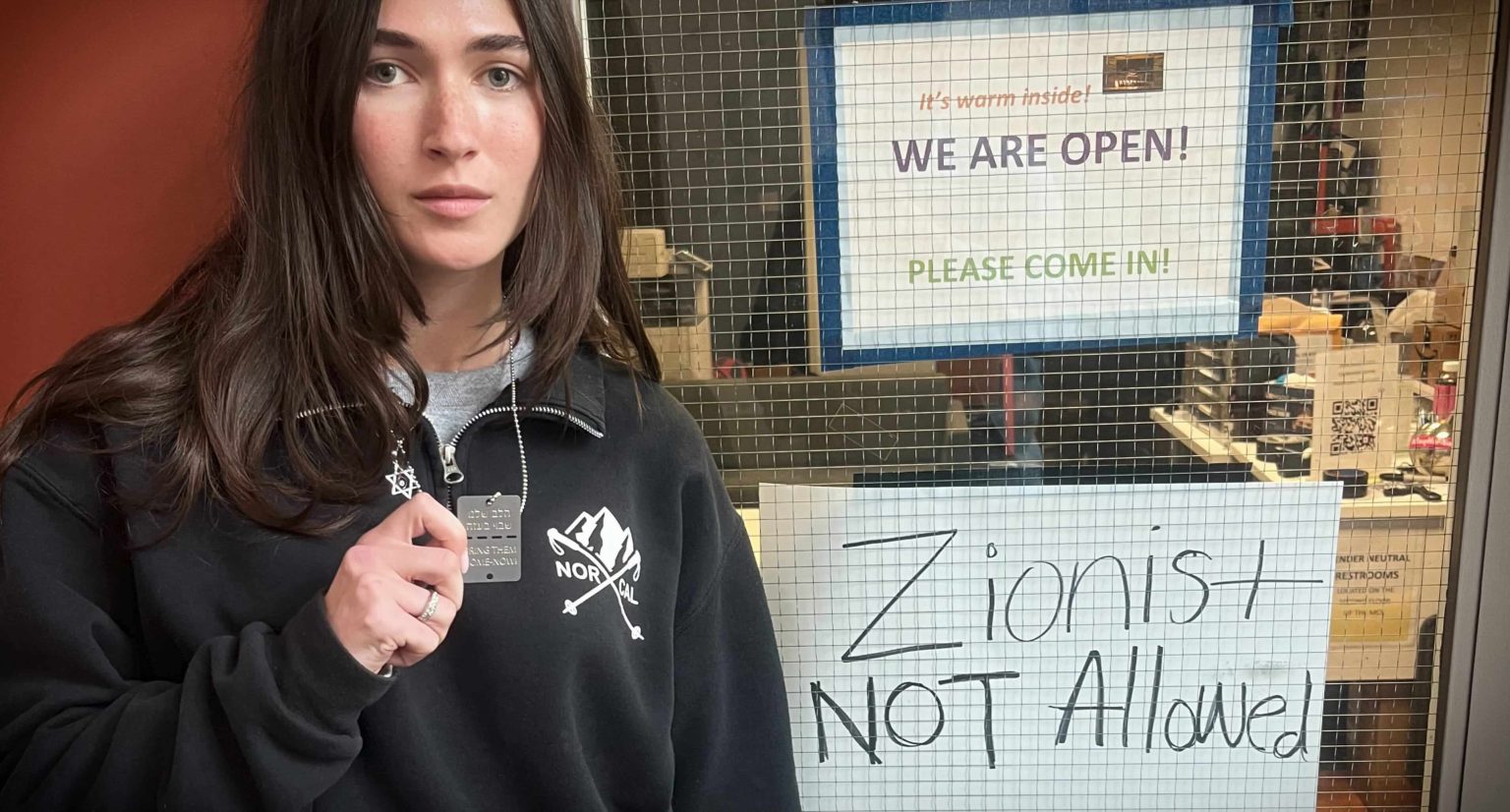
A still from the film “October 8” showing University of California, Santa Barbara student body president Tessa Veksler (Image: october8film.com)
In the end, the arguments of ‘October 8’ are only effective if a viewer believes that the rejection and disavowal of Zionism is a rejection and disavowal of Judaism and Jewish identity. The cases focused on campus activism that anchor the film do not feature any examples of anti-Jewish racism. The film instead showcases the ways that Zionists interpret, react, and are threatened by campus movements for Palestinian rights. And in this way, the true agenda of the film is revealed.
Supporting a broader right-wing agenda
All of this attention on Palestine protests comes at the expense of overlooking dangerous examples of antisemitism. For example, the violent posts by Patrick Dai at Cornell University calling for the murder of Jewish people are just briefly included in the documentary, but not focused on. This is because there was not a single authority or publication, including the NY Post, that was able to connect this student to the Palestine movement. In fact, the disregard for actual white supremacist antisemitism and the villainization of the UC Santa Barbara recall movement are not the only anti-democratic moves Sachs’ film makes.
“October 8” goes as far to blame Diversity, Equity, and Inclusion programs (DEI) for the increase in antisemitism as well. Scott Galloway, a clinical professor of marketing at NYU’s business school, attempts to problematize DEI by explaining how racial power dynamics work: “DEI started with the right intentions,” he says. “The issue is we have created this orthodoxy that’s unhealthy where we’ve decided there’s oppressors and oppressed. And there isn’t a lot of nuance here.” The insinuation here is that DEI efforts have encouraged people to over simplify complicated issues, such as the Israeli assault on Gaza. Unfortunately, Galloway does not provide the nuances that would relieve the strongest military in the world—responsible for genocide, occupation, apartheid, and the death of 50,000 people in the last 18 months— from being called an oppressor. This broader point is followed by Barnard student Noa Fay, who implies that the broad coalition building happening between the Palestine movement and other social movements is not because there is collective recognition that oppressive systems work and operate together, but because Students for Justice in Palestine has “manipulated and come to capitalize…grievances,” and in the process “hijacked every underdog cause in the world.”
These viewpoints are not outliers. “October 8” also features a roster of right-leaning speakers who have downplayed right-wing antisemitism, such as the Anti-Defamation League, which wrote off Elon Musk’s public Nazi salute as “an awkward gesture in a moment of enthusiasm,” Bari Weiss, founder of The Free Press, who is an outspoken opponent of DEI and pushed an agenda for “Democrats to vote for Trump,” and the actor Michael Rapaport who publicly supported Trump in his last election, among others. Even the tagline on the film poster – “a fight for the soul of America” – echoes Trump’s longing for “making America great again.”
One unintended strength of “October 8” however is how it offers a glimpse into how Zionists are experiencing Palestine activism, and what they think is most effective in weakening the Zionist agenda. For example, on the issue of campus resolutions, Noa Tishby declares in a close-up what she imagines is a profound statement that, “All these campus resolutions have no actual meaning. But what it does do is it trains college students that a resolution on the legitimacy of Israel is even a valid resolution to begin with.” Yes! This is true and that’s why they have so much meaning. Later, an interviewer claims, “Let’s face it: the imagery and the language of revolution and of change that they’re putting on their pro-terror narratives- it creates something that is intriguing to people.” I agree. They emphasize that pro-Palestine TikTok content is drowning out and weakening Zionist propaganda. The documentary is also chock full of lines one can redirect to its makers and reveal their hypocrisy. My favorite is by Congress member Ritchie Torres: “If we as a society cannot bring ourselves to condemn the cold-blooded murder of children and civilians with moral clarity, then we should ask ourselves what are we becoming as a society.”
The most important takeaway of the film is that the campus movements have had overwhelming success in centering Palestine and visions of liberation. There is perhaps no better or more hopeful way to close than with the words of Bari Weiss in the film. She frets, “What does it mean that the future leaders of the most important democracy in the world are chanting for revolution and intifada? What is the country going to look like a decade from now?”
When everyone has taken the meaning of intifada to heart, and risen up to fight oppression here at home and all over the world, hopefully we will be celebrating collective liberation. And, inshAllah, Bari Weiss, you and others in the film will be free from defending the most violent, colonial project of our time.
